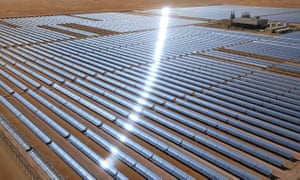RENEWABLES ARE CHANGING THE CLIMATE NARRATIVE FROM SACRIFICE TO OPPORTUNITY
THE GUARDIAN
Oil-rich countries are choosing renewables as a means to create jobs, boost GDP and improve livelihoods – as well as reduce emissions

Accelerating signs of climate change and rising global temperatures are perhaps more pressing here in the Middle East, where the International Renewable Energy Agency (Irena) is headquartered, than anywhere else on the planet.
Record-breaking temperatures made global headlines this year and a recent scientific study predicts the region will face heatwaves “beyond the limit of human survival” if climate change remains unchecked.
Indications are clear that after more than 20 years of negotiations among more than 190 countries, the UN climate conference in Paris in December – COP21 – will be a turning point in the fight against climate change. For the first time at any climate conference, renewable energy solutions will take centre stage in a series of high-profile events coupled with new commitments and announcements.
In doing so, it will also transform the climate change narrative from one of managing constraints to one of opportunity.
Take solar power in the Middle East and North Africa for example. Even though this part of the world boasts astronomical solar potential, petroleum-based economies have traditionally deployed limited renewable energy.
But dramatically falling solar photovoltaic costs, and visionary commitments by regional governments, are changing the economic equation. A solar photovoltaic tender in Dubai earlier this year resulted in record-low price of $0.06 per kilowatt hour – cheaper than domestically produced gas generation. Jordan’s recent tender results locked in power prices of between $0.06-0.08.
For oil-producing nations that use a substantial share for power generation, solar is increasingly the quickest, least-risk investment to add export capacity and revenue while satisfying rapid demand growth for electricity.
This shift is causing huge development and investment across the region. Morocco is building the world’s largest concentrated solar power plant, which will provide half the country’s energy by 2020. The UAE is building what could eventually be one of the world’s largest solar photovoltaic plants. Additional projects are in the works in Egypt, Jordan and Saudi Arabia.
The opportunity inherent in this shift is clear. A soon-to-be-released analysis from Irena finds that meeting renewable energy targets inBahrain, Kuwait, Oman, Qatar, Saudi Arabia and UAE would annually decrease fossil fuel consumption by 25% per cent in the water and power sector.
It would also cut water consumption by 20%, which is crucial in a region where fresh water is scarce, and likely to become even more so as a result of climate change. Generating solar power withdraws 200 times less water than a coal power plant to produce the same amount of electricity. Wind power requires no water at all.
The fact that renewable energy makes sense in the Middle East and North Africa speaks to the complete nature of the energy transition. If oil-rich countries are choosing renewables, so too can the rest of the world.
For many years, climate action was synonymous with sacrifice. It was a matter of what countries and individuals would have to “give up” to reduce emissions and save the planet. Now, thanks in part to the growing business case for renewable energy, climate action is increasingly being seen as a means to create jobs, boost GDP growth, and improve livelihoods, even in oil rich countries. In this context, there really is no choice to make.
- Adnan Z Amin is the director general of Irena







Global warming and Climate change is one aspect. Stopping wars and floods of refugees are also part of the picture. So is also Acidification of oceans and dramatic drop in bioproduction and oxygen depletion. Renewables are the future. The fossil fuels the past. Invest in the future! http://ufbutv.com/2014/08/11/over-to-renewables-now/